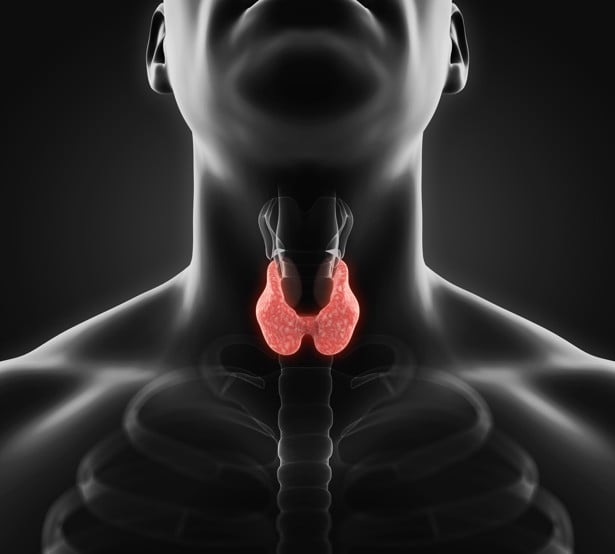
Jet Li and hyperthyroidism: what you should know about the illness haunting martial arts superstar
Actor is not the only celebrity to suffer thyroid problems: Oprah Winfrey, Gigi Hadid, Missy Elliott, Rod Stewart and George Bush have all had issues. But what is hyperthyroidism, how is it treated and how do you know if you have it?
Two medical professional groups from Europe and the United States founded World Thyroid Day on May 25, 2008 to raise awareness of thyroid-related diseases that affect tens of millions around the world.
A decade later, photos of the ailing martial arts superstar Jet Li Lianjie, who has been battling with hyperthyroidism for years, prompted concerns and sympathy from fans across the globe.
Martial arts superstar Jet Li has been plagued by injuries since his teens
Hyperthyroidism accelerates the body’s metabolism and can lead to serious complications if left untreated, such as heart failure and osteoporosis.
The disease affects around 1 per cent of the global population and 1.6 per cent of the Chinese urban population, according to a study by researchers at China Medical University in 2010.
“In Hong Kong, it’s most common among women 20 to 40 years old,” says Dr Cheung Wai-shing, an endocrinologist practising in Hong Kong’s Jordan district.

Nearly 60 per cent of people with thyroid disease in the United States are unaware of their condition, according to the American Thyroid Association, which created World Thyroid Day with the European Thyroid Association.
The good news is that most patients can regain normal thyroid functions after seeking appropriate treatment. Here are answers to some of the most common questions associated with the condition.
What is hyperthyroidism, and how do you know you might be suffering from it?
A butterfly-shaped organ called the thyroid gland is located at the base of your neck. It is small but controls one of the most important aspects of the human body: metabolism. It does so through the thyroid hormones it secretes.
Hyperthyroidism happens when the thyroid is in overdrive and produces too much thyroid hormone, accelerating the metabolism.
The most important thing in preventing hyperthyroidism is to make your life more leisurely
Common symptoms include fast heartbeat, weight loss, irritability, difficulty in sleeping, heat intolerance, increased sweating, swelling in the neck and weak muscles.
Women are five to eight times more likely to have thyroid problems than men, according to the American Thyroid Association.
What are the causes of hyperthyroidism?
The most common cause is Graves’ disease, an autoimmune disorder that increases the production of antibodies to stimulate thyroid hormones. The disease can also lead to eye problems such as bulging eyes.
While the exact causes of Graves’ disease remain unknown, studies suggest genetic and environmental factors, including stress, might be involved.
“The most important thing in preventing hyperthyroidism is to make your life more leisurely,” Cheung says. “The thyroid hormone itself is a stress hormone. It will shoot up if the patient has high levels of stress over a period of time.”

To help prevent high thyroid hormone levels, Cheung recommends getting enough sleep, exercising regularly and quitting smoking.
Apart from Graves’ disease, other causes of hyperthyroidism include inflammation of the thyroid and excessive intake of iodine, either from food or other medications.
How is hyperthyroidism treated?
“The key is to normalise the thyroid hormone levels,” says Professor Karen Lam Siu-ling, a professor in endocrinology and metabolism at the University of Hong Kong. This can be achieved through three kinds of treatments: medication, radioactive iodine and surgery.
There are two types of common anti-thyroid drugs – methimazole and propylthiouracil – which prevent the thyroid from producing excessive hormones. They can usually control hyperthyroidism within a few months, but a standard course is 18 months.

Potential side effects of the drugs include skin rash, liver damage, joint pain and, in very rare cases, a low white blood cell count, Lam says. The disease can recur in half of patients after one course of medication.
The second option, radioactive iodine treatment, damages or destroys thyroid cells without affecting other cells in the body, because only thyroid cells can absorb iodine. Most patients can be cured after one dose, Lam says.
Pregnant women are barred from radioactive iodine, and patients should not get pregnant within six months of the treatment as it may affect their reproductive functions.
A lot of people believe diseases like hyperthyroidism and diabetes can be treated by themselves. They are wrong
Finally, surgery to remove part of the thyroid can also control thyroid hormone levels. Risks involved include bleeding and damaging surrounding tissues.
“The most important thing is for patients to understand the pros and cons of each treatment and come to an agreed treatment,” Lam says.
Cheung recalls a patient a few years ago who did not trust Western medicine and insisted on using herbal remedies and exercising on her own.
Why thyroid problems and their symptoms should be examined by health professionals
Her thyroid functions worsened significantly over the eight months she was trying to treat herself, and she started to experience sleeplessness and suffer from delusional disorder. She eventually agreed to take medication, and soon recovered.
“A lot of people believe diseases like hyperthyroidism and diabetes can be treated by themselves,” Cheung says, adding, “They are wrong.”
What is hypothyroidism?
Although they are on the opposite ends of the spectrum, going from hyperthyroidism to hypothyroidism (an underactive thyroid), or vice versa, happens regularly.
Aggressive treatment of hyperthyroidism can lead to hypothyroidism, and autoimmune problems related to the overproduction of certain antibodies can trigger both. Symptoms of hypothyroidism include depression, weight gain, constipation and intolerance of cold.
American talk show host Oprah Winfrey struggled with thyroid problems for years. Her hyperthyroidism morphed into hypothyroidism and her weight fluctuated wildly, before she announced her “thyroid levels are all in the normal range” in 2009.
How yoga, trail running and a vegan diet changed Hongkonger’s life – and cured her underactive thyroid
Other celebrities who have fought with thyroid problems include supermodel Gigi Hadid (hypothyroidism); US hip-hop legend Missy Elliott (Graves’ disease); British rocker Rod Stewart (thyroid cancer); and former US President George Bush and his late wife Barbara, who were both diagnosed with Graves’ disease.

